

INEOS Attack Ayuso on Leysin | Tour de Romandie 2024 Stage 4
- Uncategorized

Climbing Prospects Battle in the Sun | Tour of Turkey 2024 Stage 6
- Race Recaps

Luke Plapp Performs at a High Level before the Giro | Tour de Romandie Stage 2 2024

Giro d’Italia Podium Contenders Battle | Tour of the Alps 2024 Stage 3
- wout van aert
- WorldTour Ranking
- WorldTour Calendar
- world tour relegation
- women cycling power
- watts analysis
- warren barguil
The New WorldTour Points System Explained

Following complaints from numerous teams about the WorldTour’s promotion and relegation system, the UCI has published new regulations with significant changes. The rule amendment has been published less than a month before the start of the new 2023-2025 triennium, whose cumulative ranking will determine which 18 teams will be part of the WorldTour in 2026-2028.
In summary, there have been three important changes, which will be discussed in more detail below:
- The UCI points scale gives much more importance to Grand Tours and Monuments, as well as to stages in WorldTour stage races.
- The UCI World Ranking for teams, both annually and across the triennium, will take into account the 20 best riders of each team, instead of 10 as at present.
- Teams relegated by the sporting criterion will have automatic invitations in 2023 for the entire UCI WorldTour, except for the Grand Tours. In practice, this allows Israel – Premier Tech to receive automatic invitations to all one week WorldTour stage races, even though they did not qualify for them under the rules in force during the 2020-22 triennium.
UCI Points Allocation
The UCI has revolutionised the scoring system for the next three years (2023-2025), with the objective of incentivising the best riders to participate in the most important races. To this end, they have multiplied by a factor of 1.6x the points allocated to the Monuments and the Road Race of the World Championships and Olympic Games. The points in the general classification of the Grand Tours and the ITT of the World Championships and Olympic Games have also been multiplied by a factor of 1.3x.
However, the most impactful change is the value of stages in Grand Tours and the rest of the WorldTour stage races. Whereas before only the top 5 in a Grand Tour stage and the top 3 in the rest of the WorldTour stages were awarded points, in 2023 the top 15 in a Grand Tour stage and the top 10 in the rest of the WorldTour stages will be awarded points. In addition, a much higher value will be given on places of honour in the stages. For example, in 2022 an individual stage in the Tour distributed a total of 240 UCI points, whereas in 2023 it will distribute 935 UCI points, a 290% increase.
In the following image, you can see the new scoring system, with the new Monuments category, differentiated from the rest of the classics. We recommend you to download it in high resolution from here .

Based on the calendar contested in 2022, this change in the scoring system means that there are 28% more UCI points at stake (308,903 vs. 241,027). But as the scoring of the continental circuit races has virtually remained the same (except for a slight increase in points for the ProSeries stages), this smaller calendar will see its importance reduced. Whereas under the previous scoring system the continental calendar shared half of the available UCI points, in 2023 it will share 40%.

As we can see in the graph, the most important races (Grand Tour, Monuments and Worlds) will now have a much higher weight (36% vs 23%). This was a demand from many WorldTeams and even fans, although it will hurt teams that do not have automatic access to those races, like Uno-X. The new scoring system will also benefit ProTeams that have wildcards for WorldTour races in 2023 (such as Lotto, Total and Israel) over those that do not (Uno-X and the rest), as they will be more likely to keep the invitations season after season with immediate access to the most profitable races.
Also the weight of the classics (except for the Monuments) is reduced in favour of stages in stage races. In 2022, all teams at risk of relegation added a large number of minor classics to their calendar, but from 2023 they will have to look for more places of honour in WorldTour stages. The forgotten riders of the previous points system, breakaway stage hunting specialists and consistent stage race sprinters, are suddenly much more valuable under the new scoring system. For example, Hugh Carthy targeted breakaway stages in the second-half of the Giro d’Italia 2022, placing fourth on the stages to Cogne and Lavarone, earning him a paltry 24 UCI points.

Under the new system, Carthy would have scored 160 points across both stages, a 567% increase. In the bunch sprints, Alberto Dainese scored 108 points across the three weeks of Il Giro 2022, but in 2023 he would have scored 370 points for his victory and five top 10 placements.

While most of the changes are logical, the UCI has left the door open to some schedule ‘optimisation’. For example, Continental Championships outside Europe still award 250 points to the winner of the road race (more than a stage of the Tour) and National Championships (some with a very low sporting level) still award 100 points to the winner of the road race.
20 Riders Count per Team
From 2023, the UCI World Team Ranking, used for the relegation battle ranking and to hand out automatic wildcards annually, will take into account the top 20 riders per team instead of the top 10. According to the UCI, this “will help to reduce the pressure currently imposed on only a limited number of riders, which can lead to a number of negative consequences (risks of injury, excessive number of race days, temptation to doping, etc.)”.
To better understand the impact of the new measure, the following graph shows how the 2020-2022 ranking would have changed if the top 20 riders had been taken into account. Lotto Soudal and Israel – Premier Tech would have been relegated anyway, although Israel would have been much closer to salvation.

The teams most dependent on their leaders (Jumbo, Alpecin, Movistar or BikeExchange) would have added the least percentage of points. ProTeams with shorter squads or without 20 riders capable to score points, such as Uno-X, Bingoal or Q36.5, will also be disadvantaged in 2023. Teams such as Quickstep or UAE Team Emirates, with large race programs and a deep pool of riders capable of scoring points, should be advantaged by this change.
The Israel Rule
The latest and perhaps most unexpected change is the UCI’s decision to “gift” Israel with invitations to all one week WorldTour stage races in 2023. It is worth remembering that Israel Premier Tech finished third in the ranking that awarded the 2023 wildcards and had therefore only won the wildcards to the one day WorldTour races on sporting merit. The UCI has clarified that the measure is temporary only for 2023, “coming as it does after three years of significant upheaval due to the global pandemic.”

This emergency measure by the UCI has surely calmed down Israel – Premier Tech owner Sylvan Adams after the millionaire threatened to sue the UCI for the implementation of the relegation system. Israel are also a favourite for the Giro and Tour discretionary organiser wildcards, so they will not feel the effects of the relegation as much, with the Vuelta being the only major race they will likely be absent from in 2023. The extra invitation for Israel takes a wildcard away from the organisers of one week WorldTour races and hurts again modest teams like Uno-X, Q36.5 or Kern Pharma.
The only constant about the UCI points and relegation system is that it is always changing, this time at very short notice. In imperfect systems there will always be winners and losers from structural changes such as these, with teams like UNO-X surely aggrieved by new regulations that make their path to WorldTour promotion more difficult. However if the changes function as intended, there may be some positives for the fans, with teams like Lotto-DSTNY now incentivised to send superstar Arnaud de Lie to more major stage races rather than entirely focussing on a local calendar.
18 comments
Always a must-read! 👏🏻 In your personal opinion will the “Sylvan Adams” rule actually help his team score more points? their squad seems weaker than it was last year so i don’t see them scoring many points in the 2.UWT races, even if they send their best riders, what would hurt their ability to score points at smaller races that occur at the same time.
Also it seems like a bad decision from the UCI to publish the rules change a week before 2023 and not much earlier when teams could’ve had times to perhaps sign other riders or tweak the training program, well unless the teams were told about these future changes in advance.
Good article indeed.
And announcement is too late indeed.
The fact they have starting right (not obligation) is obviously a plus for Israel. Also the increased points are obviously an advantage I think. They have more GC guys than Total and Lotto. Lotto also only has 26 riders under contract.
Short term only those two teams and Uno-X matter. If they do a lot more races than some of the WorlTour teams, they will promote again. But being in the top 2 of the ProTour teams is crucial for that promotion.
Lotto should now hire extra racers and also fully use the advantages of its development team (Total does not have a development team).
Overall I like the changes, and think they are all going in the right direction. I wonder if they have overshot the mark on some of them though.
The increase in points for stage wins is great. A stage win at the TdF worth more than a ProSeries win makes sense. I’m just not sure placings down to 15 needed points though. Maybe points just to the top 10 would have been enough.
Counting the top 20 riders seems an overshoot as well. I agree that the top 10 was too few. Was the “reasoning” to make sure domestiques didn’t feel pressure ? Maybe just the top 15 would be better.
Maybe next year, or in three years, we will see refinements and adjustments again, perhaps backing down a bit on these changes.
Agree that top 15 would have been better.
Top 20 is really bad for the protour teams with only 20 racers (although their chance to end up in the top 2 or promotion spots is low).
Also Lotto is kind of forced to hire 4 extra racers to score I think. There are still some options, but they are limited. They could also promote racers out of the development team whose points then probably count when they race with the development team in .1 and .pro races? It might remove their opportunity to do .2 races?
As for the top 15 spots that count in the Tour de France I like it for Tour de France as those positions still count for the Green Jersey. And for other stage races it is logical only the top 10 counts.
For the one day races, up the top 60 counts. I think that should be changed. For 1.1 races, you could count top 20, for 1.pro top 30, for 1.UWT top 40 and for monuments top 50.
Or even less points: top 10 for 1.1., top 15 for 1.pro, top 20 for worst UWT, top 25 for best UWT and top 30 for monuments. I am suprised they didnt change points in the one day races.
The reasoning is that under the old system we reached a point near the end of the year where riders outside the top 10 on good form had to domestique for riders in the top 10 because otherwise they wouldn’t score any points.
Indeed. That was bad. It had to be more than top 10 racers, but 20 seems too much.
- Pingback: Quién sale ganando y quién no en el nuevo sistema de puntos de la UCI – Ciclismo en TV
Silly question, if you will: are all WT teams safe now until the next triennium in ‘26, or do we go again next year, for the final year of the past three? PS, I refresh this page most days for the next instalment, keep up the great work.
Everyone keeps their WT license for the next 3 years based on the promotion / relegation system. Of course some teams may fold or lose their license for financial or other reasons, but promotion / relegation is only on a 3 year cycle.
The wildcards for the Proteams like Lotto, Israel and TotalEnergies is determined annually though
Brilliant, thanks…and Merry Christmas
En principio me pareció que aumentar la puntuación en carreras WT era necesario y merecido, en cuanto eso me parece correcto, sin embargo el análisis conlleva al problema de la factibilidad de que los actuales equipos WT de desempeño medio bajo y Pro con invitación a las pruebas WT se mantengan ahí sin afanes y muy cómodos, y que equipos ProTour (especialmente los de licencias distintas a la española, francesa, italiana y belga) se vean tan damnificados en aspirar a ascender de categoría que tal vez varios prefieran migrar próximamente a continental. Creo que con esto se crea un veto.
Los cambios favorecen la estabilidad de los equipos WT y dificultan los cambios y los ascensos. De todos modos, está bien que se mantenga el sistema de ascensos y descensos después de tantas presiones. Si los equipos de segunda división hacen bien su trabajo seguirán teniendo sus opciones de ascender, aunque sea un poco más difícil.
Muchas gracias Raúl. Tremendo trabajo. Este post es de lectura obligatoria para cualquier persona que siga el ciclismo profesional.
- Pingback: The Top 10 riders set to Benefit from the New UCI Points System - Lanterne Rouge
- Pingback: UAE and Jumbo fight for Top Spot whilst De Lie Boosts Lotto | UCI Ranking Analysis - Lanterne Rouge
- Pingback: Giro d’Italia et Tour de France, ne pédalez pas pour l’apartheid israélien – 🔴 Info Libertaire
- Pingback: EF Education-Easypost Prosper as Jayco-Alula Struggle Again | UCI April Ranking Analysis - Lanterne Rouge
- Pingback: The Giro Rewards Breakaways with Israel Securing 2024 Wildcards | UCI May Ranking Analysis - Lanterne Rouge
Leave a Reply Cancel reply
Your email address will not be published. Required fields are marked *
Save my name, email, and website in this browser for the next time I comment.
Notify me of new posts by email.
- Tour de France
- Giro d'Italia
- La Vuelta ciclista a España
- World Championships
- Milano-Sanremo
- Amstel Gold Race
- Tirreno-Adriatico
- Liège-Bastogne-Liège
- Il Lombardia
- La Flèche Wallonne
- Paris - Nice
- Paris-Roubaix
- Volta Ciclista a Catalunya
- Critérium du Dauphiné
- Tour des Flandres
- Gent-Wevelgem in Flanders Fields
- Clásica Ciclista San Sebastián
- UAE Team Emirates
- Arkéa - B&B Hotels
- Astana Qazaqstan Team
- Alpecin-Deceuninck
- Bahrain - Victorious
- BORA - hansgrohe
- Decathlon AG2R La Mondiale Team
- EF Education-EasyPost
- Groupama - FDJ
- INEOS Grenadiers
- Intermarché - Wanty
- Lidl - Trek
- Movistar Team
- Soudal - Quick Step
- Team dsm-firmenich PostNL
- Team Jayco AlUla
- Team Visma | Lease a Bike
- Grand tours
- Top competitors
- Final GC favorites
- Stage profiles
- Riders form
- Countdown to 3 billion pageviews
- Favorite500
- Profile Score
- Women's World Tour (WWT)
- 2022-2023 Promotion/relegation
- Men elite - Men elite
- Women elite - Women elite
- Junior men - Junior men
- National - National
- UCI World Ranking
- Date 2024-04-23 2023-12-26 2022-12-27 2021-12-31
- Nation - Albania Algeria Angola Argentina Australia Austria Azerbaijan Belarus Belgium Belize Bermuda Botswana Brazil Bulgaria Burkina Faso Cameroon Canada Chile China Colombia Costa Rica Croatia Cuba Curacao Cyprus Czech Republic Denmark Dominican Republic Ecuador El Salvador Eritrea Estonia Ethiopia Finland France Georgia Germany Great Britain Greece Guatemala Hongkong Hungary India Indonesia Iran Ireland Israel Italy Ivory Coast Japan Kazakhstan Kenya Kosovo Kuwait Laos Latvia Lebanon Lithuania Luxembourg Malaysia Mauritius Mexico Moldova Mongolia Montenegro Morocco Namibia Netherlands New Zealand North Macedonia Norway Pakistan Panama Philippines Poland Portugal Puerto Rico Romania Russia Rwanda Serbia Singapore Slovakia Slovenia South Africa South Korea Spain Sweden Switzerland Syria Taiwan Thailand Tunisia Türkiye Uganda Ukraine United Arab Emirates United States Uruguay Uzbekistan Venezuela
- Age >= = Between
- Team - Alpecin - Deceuninck Arkéa - B&B Hotels Astana Qazaqstan Team Bahrain - Victorious BORA - hansgrohe Cofidis Decathlon AG2R La Mondiale Team EF Education - EasyPost Groupama - FDJ INEOS Grenadiers Intermarché - Wanty Lidl - Trek Movistar Team Soudal Quick-Step Team dsm-firmenich PostNL Team Jayco AlUla Team Visma | Lease a Bike UAE Team Emirates Bingoal WB Burgos - BH Caja Rural - Seguros RGA Equipo Kern Pharma Euskaltel - Euskadi Israel - Premier Tech Lotto Dstny Q36.5 Pro Cycling Team TDT - Unibet Cycling Team Team Corratec - Vini Fantini Team Flanders - Baloise Team Novo Nordisk Team Polti Kometa TotalEnergies Tudor Pro Cycling Team Uno-X Mobility VF Group - Bardiani CSF - Faizanè 7Eleven Cliqq Roadbike Philippines ABTF Betão - Feirense AC Sparta Praha Adria Mobil Airtox - Carl Ras Aisan Racing Team Almaty Astana Motors Alpecin-Deceuninck Development Team APHotels & Resorts / Tavira / SC Farense ARA | Skip Capital Arkéa - B&B Hôtels Continentale Astana Qazaqstan Development Team ATT Investments Aviludo - Louletano - Loulé Concelho Baloise - Trek Lions BEAT Cycling Club Beltrami TSA - Tre Colli Best PC Beykoz Belediyesi Spor Türkiye BHS - PL Beton Bornholm Biesse - Carrera BIKE AID Bingoal WB Devo Team Bodywrap Men's Cycling Team Canel's - Java CCACHE x Par Küp Chengdu Cycling Team China Glory - Mentech Continental Cycling Team CIC U Nantes Atlantique Colombia Potencia de la Vida - Strongman Credibom / LA Alumínios / Marcos Car CTF Victorious Decathlon AG2R La Mondiale Development Team Development Team dsm-firmenich PostNL Diftar Continental Cyclingteam Dukla Banska Bystrica Efapel Cycling Elkov - Kasper Energus Cycling Team Epronex - Hungary Cycling Team Equipe continentale Groupama-FDJ EuroCyclingTrips - YOELEO Ferei Quick-Panda Podium Mongolia Team Gapyeong Cycling Team General Store - Essegibi - F.Lli Curia Geumsan Insam Cello Giant Cycling Team Global 6 United Go For Gold Philippines Grant Thornton Cycling Team GW Erco Shimano Hagens Berman - Jayco Hainan Wuzhishan Cycling Team Hebei Continental Team Hengxiang Cycling Team HKSI Pro Cycling Team Hrinkow Advarics Huansheng - SCOM - Taishan Sport Cycling Team Hustle Pro Cycling Illes Balears Arabay Cycling Israel Premier Tech Academy Java - Inovotec Pro Team JCL Team UKYO Kelapa Gading Bikers Kelly / Simoldes / UDO Kinan Racing Team Konya Büyükşehir Belediye Spor Korail Cycling Team KSPO Professional Levante Fuji Shizuoka Li Ning Star Lidl - Trek Future Racing Lillehammer CK Continental Team Ljubljana Gusto Santic Lotto Dstny Development Team LTwoo Men's Cycling Team Lubelskie Perła Polski LX Cycling Team Madar Pro Cycling Team Malaysia Pro Cycling Maloja Pushbikers Matrix Powertag May Stars Mazowsze Serce Polski MENtoRISE MLMsuperstars Metec - SOLARWATT p/b Mantel Mg.K Vis - Colors for Peace MitoQ - NZ Cycling Project Motala AIF Serneke Allebike MYVELO Pro Cycling Team Nice Métropole Côte d'Azur Novapor Speedbike Team Nu Colombia Nusantara Cycling Team Orgullo Paisa P&S Metalltechnik Benotti Panamá es Cultura y Valores Pardus Cycling Team Parkhotel Valkenburg Pauwels Sauzen - Bingoal Petrolike Philippe Wagner/Bazin Pierre Baguette Cycling Pingtan International Tourism Island Cycling Team Plus Performance - Solutos Project Echelon Racing Q36.5 Continental Team Rad-Net Oßwald Rádio Popular - Paredes - Boavista REMBE Pro Cycling Team Sauerland Rime Rime Drali Roojai Insurance Sabgal / Anicolor Saint Piran Sakarya BB Pro Team Santic - Wibatech Sava Kranj Cycling Seoul Cycling Team Shenzhen Xidesheng Cycling Team Shimano Racing Sidi Ali - Unlock Team Soudal - Quick-Step Devo Team Sparkle Oita Racing Team Spor Toto Cycling Team St George Continental Cycling Team St Michel - Mavic - Auber93 STAMINA Racing Standard Insurance PHI SuezCanalDiscovery Swift Carbon Pro Cycling Brasil Tarteletto - Isorex Tashkent City Professional Cycling Team Tavfer-Ovos Matinados-Mortágua Team Banco Guayaquil - Bianchi Team BridgeLane Team Bridgestone Cycling Team ColoQuick Team Coop - Repsol Team Deschacht - Group Hens - Containers Maes Team Ecoflo Chronos Team Felt Felbermayr Team Lotto Kern-Haus PSD Bank Team MBH Bank Colpack Ballan Team Medellín Team Novo Nordisk Development Team Saitel Team Sistecredito Team Skyline Team Storck - Metropol Cycling Team Technipes #inEmiliaRomagna Team Visma | Lease a Bike Development Team Vorarlberg Terengganu Cycling Team Thailand Continental Cycling Team The Hurricane & Thunder Cycling Team Tianyoude Hotel Cycling Team Tirol KTM Cycling Team Trinity Racing Tudor Pro Cycling Team U23 TUFO - Pardus Prostějov UAE Team Emirates Gen Z UijeongBu Cycling Team UM Tools Caffé Mokambo Universe Cycling Team Uno-X Mobility Development Team Utsunomiya Blitzen Van Rysel - Roubaix VC Fukuoka Velolien Matsuyama Victoire Hiroshima Victoria Sports Pro Cycling Team Vini Monzon - Savini Due - OMZ Vino SKO Team VolkerWessels Cycling Team Voltas - Tartu 2024 by CCN Voster ATS Team Wanty - ReUz - Technord Work Service - Vitalcare - Dynatek WSA KTM Graz XSpeed United Continental Zalf Euromobil Fior
- Page 1-100 101-200 201-300 301-400 401-500 501-600 601-700 701-800 801-900 901-1000 1001-1100 1101-1200 1201-1300 1301-1400 1401-1500 1501-1600 1601-1700 1701-1800 1801-1900 1901-2000 2001-2100 2101-2200 2201-2300 2301-2400 2401-2500 2501-2600 2601-2700 2701-2800 2801-2900 2901-3000 3001-3100 3101-3200 3201-3300 3301-3336
- Teamlevel - WorldTour ProTeam Continental Team
- U23 Nations
- Professional wins
- Individual (daily)
- One day races
- Season individual
- Nations (Olympic selection)
Grand Tours
- Vuelta a España
Major Tours
- Volta a Catalunya
- Tour de Romandie
- Tour de Suisse
- Itzulia Basque Country
- Milano-SanRemo
- Ronde van Vlaanderen
Championships
- European championships
Top classics
- Omloop Het Nieuwsblad
- Strade Bianche
- Gent-Wevelgem
- Dwars door vlaanderen
- Eschborn-Frankfurt
- San Sebastian
- Bretagne Classic
- GP Montréal
Popular riders
- Tadej Pogačar
- Wout van Aert
- Remco Evenepoel
- Jonas Vingegaard
- Mathieu van der Poel
- Mads Pedersen
- Primoz Roglic
- Demi Vollering
- Lotte Kopecky
- Katarzyna Niewiadoma
- PCS ranking
- Points per age
- Latest injuries
- Youngest riders
- Grand tour statistics
- Monument classics
- Latest transfers
- Favorite 500
- Points scales
- Profile scores
- Reset password
- Cookie consent
About ProCyclingStats
- Cookie policy
- Contributions
- Pageload 0.0683s
2023 Men's and Women's WorldTour stats, notes and oddball facts - Analysis
From top ranked teams and riders to most penalized riders, a season wrap-up in numbers


Team rankings
Individual rankings, oddball facts.
The 2023 Men's and Women's WorldTour is a wrap and Cyclingnews dug deep into the data, pulling out a wide variety of statistics, notes and oddball facts.
First, let's get to the basic stats of which teams and riders were the most successful before digging deeper into the data from the season.
We'll start with the UCI's World Rankings. The individual rankings are based on a rolling 12-month window of results, with riders earning points for everything from stage or one-day race finishes, overall classifications of stage races, leading a stage race, and for Grand Tours, winning the points or mountains classification. It also includes national, continental, and world championships and regional games.
There are also team rankings which, for men, are based on each team's top 20 scoring riders, and for women are based on each team's top 8 riders.
With wide-ranging success from the Tour of Flanders, Amstel Gold Race and Flèche Wallonne and Il Lombardia to podiums at the Tour de France and Worlds, Tadej Pogačar topped the men's individual rankings.
Demi Vollering and her SD Worx teammates wrote the definition of the word dominance in 2023. Vollering walked away with the most individual wins and points after hardly putting a foot wrong all year.
Get The Leadout Newsletter
The latest race content, interviews, features, reviews and expert buying guides, direct to your inbox!
We focused on the top 22 teams in the men's World Rankings - these are the teams most likely to be seeking a place in the WorldTour in the next promotion/relegation round at the end of 2025 - and the top 18 women's teams, most of which are seeking WorldTour status in 2024.
UAE Team Emirates topped the UCI World Rankings for teams in 2023, scoring a massive 30,958 points. They finished ahead of Jumbo-Visma, who won the Tour de France, Giro d'Italia and swept the podium in the Vuelta a España, largely due to Pogačar's victories in the Monuments and podiums at the Tour de France and UCI Road World Championships. Soudal-Quickstep were the next best with 18,698.
This season represented the first year of the three-year UCI promotion/relegation cycle for men, and a couple of teams will have grave concerns about their future, being outside the top 18 teams and not meeting the sporting requirement to remain in the WorldTour in 2026 so far.
Astana Qazaqstan finished a dismal 20th and are almost 2,000 points adrift of Team dsm-firmenich, who are in 18th. Arkéa-Samsic didn't fare much better, earning only 185 points more.
Currently ProTeams after being relegated, Lotto-Dstny and Israel-Premier Tech can feel quite a bit more confident after landing firmly inside the top 16. They will earn automatic entry into the WorldTour races next season. Uno-X were the next-best ProTeam and will be automatically invited to WorldTour one-day races in 2024.
This season was the end of the promotion/relegation cycle for the Women's WorldTour, and there are 18 applicants for 15 Women's WorldTour licences available for the 2024 and 2025 seasons.
This is the first season that the women's teams have faced a relegation system as the sport governing body introduced a new 'sporting' requirement, which adds together each team's UCI points across the 2022 and 2023 seasons. This new points requirement will be taken into consideration alongside the other four criteria: administrative, ethical, financial, and organisational.
Because of the demise of the EF Education-Tibco-SVB team and the merger between Liv Racing Teqfind and Team Jayco-Alula, all of the teams currently in the top tier should be able to remain put.
AG Soudal-Insurance-Quickstep should join the WorldTour along with Ceratizit-WNT. Cofidis, along with most of the other lower-ranked teams, did not opt to apply. The Basque Laboral Kutxa-Fundacion Euskadi team applied but are well outside the top 15 teams.
Tadej Pogačar (UAE Team Emirates) dominated the men's individual rankings - a 12-month rolling window of points gained. He earned 7,695.86 points. Tour de France winner Jonas Vingegaard (Jumbo-Visma) was next with 6,307, and Remco Evenepoel (Soudal-Quickstep) third with 5,631.71.
Demi Vollering (SD Worx) was equally dominant, taking home 6,038.86 points with second placed teammate, World Champion Lotte Kopecky earning 4,367. Marlen Reusser and Lorena Wiebes made it an SD Worx sweep of the top four spots, with Annemiek van Vleuten the best non-SD Worx rider in fifth.
Jasper Philipsen (Alpecin-Deceuninck) brought home the most wins in 2023 at 19. The Belgian's four Tour de France stages and the green jersey were the most prestigious, but he also claimed the Classic Brugge-De Panne and Scheldeprijs, among other fine results.
Pogačar was next with 17 wins, rounding out the individual winner's podium. Primož Roglič and Vingegaard claimed 15.
Vollering won the most in the women's peloton with 17, Kopecky claimed 14 wins including the coveted rainbow jersey in Glasgow, and Charlotte Kool nudged Lorena Wiebes off the podium, getting one more victory than the Dutch rider at 13.
Jumbo-Visma won the most as a team with 66 victories, Soudal-Quickstep had 58, and UAE Team Emirates 57.
SD Worx dominated the women's season with 60 wins, FDJ-Suez were next at 19 and Movistar Team at 18.
In 2023, the riders of the top 22 teams raced an average of 57 race days, with some of them competing across many more. The women's top 18 teams raced an average of 36 days. Cyclingnews ranked riders based on points earned per days raced to put a quality figure on each rider's season.
The world's top ranked rider Pogačar only raced 48, making his racing days the highest quality at more than 160 points per day. Second-ranked Jonas Vingegaard gained an average of 95.5 points per day.
Wout van Aert, racing 51 days, had the third-highest quality factor at 93.3 points per race day, and Mathieu van der Poel earned 92.5 average over 45 days.
Of the results that factored into each team's rankings, Vingegaard had the highest average finishing position at 2.7 and the most results earning points - 64 different finishes from stages, GC, wearing the maillot jaune etc. Vingegaard only had a handful of finishes outside the points, mainly on sprint stages at Paris-Nice, Itzulia Basque Country, the Criterium du Dauphiné, Tour de France and Vuelta a España.
Remco Evenepoel was next with 56 results and an average rank of 3.375.
Demi Vollering, Lotte Kopecky, and Puck Pieterse had the highest quality seasons in the women's peloton. Vollering raced 46 days and earned an average of 131.6 points per day. Kopecky was not far behind with 129 points average across her 34 days of racing.
Pieterse made a very brief road appearance before turning to mountain bike racing, and her fifth place in Strade Bianche was worth 180 points.
Lanterne Rouge
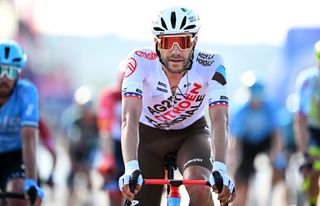
The domestiques of the peloton work in the shadows of the star riders, often competing in many more races than a rider like Pogačar or Vingegaard. They're called into service to fill out rosters for the sick or injured and to support leaders. Their job isn't to score points but to bury themselves for the riders that do.
It can look fruitless to race all season and barely score a point, but it's a badge of honour. Larry Warbasse wins the Lanterne Rouge prize for the 2023 season.
Warbasse completed 87 race days, and the most kilometres of racing at 13,787 (according to FirstCycling.com) - second only to Luis Léon Sanchez (Astana), who raced 88 days. During that time Warbasse only accumulated 80 points, but helped his team to 17th place in the UCI rankings.
In the women's peloton, Elizabeth Stannard (Israel-Premier Tech Roland) raced 58 days and earned just 112 points, her hard work not counting directly toward the team's rankings, making her the women's Lanterne Rouge.
Claire Steels and Barbara Malcotti raced the most days with 63 but earned enough points to make their team's top 8.
Riders are penalized UCI points for a variety of rule violations, for anything as innocuous as tossing their bidons and trash outside designated zones to the far more egregious endangering fellow riders. Intermarché-Circus-Wanty were penalized the most on the men's side, while FDJ-Suez were docked the most points in the women's peloton.
Fair play award :
AG2R Citroën - the only team of the top 22 to go the entire season without a penalty. The women's peloton was much better behaved and had 13 of the 18 top teams go without penalties.
Red cards :
Niccolo Bonifazio got the most penalties in 2023, 100 of which came from an incident at the Giro d'Italia for "improper conduct or behaviour that is indecent and that endangers others (directed at a rider)" and 25 points for tossing a bidon.
On the women's side, FDJ-Suez had 70 penalty points, 55 of which came from Cecilie Uttrup Ludwig.
Bad boy team :
Not considering Bonifazio, who brought Intermarché-Circus-Wanty's penalty tally from 100 points to 225, the Ineos Grenadiers were the team that flouted the rules the most, racking up 190 points from five different riders: Tom Pidcock lost 50 points, Filippo Ganna 40 and Egan Bernal, Jonathan Castroviejo, Magnus Sheffield and Geraint Thomas all were docked 25 for various minor offences.
Costliest penalty :
On stage 16 of the Giro d'Italia, Marius Mayrhofer (Team dsm-firmenich) ran afoul of the UCI's rules on littering, dropping his waste outside of the designated zone. That offence cost him 25 UCI points - which doesn't seem like a lot until you consider that the penalty dropped his team behind AG2R Citroën into 18th place, putting them closer to the relegation zone.
WorldTour outlook
The UCI expanded the World Ranking team classification to the top 20 riders' points after the last relegation round in 2022 after teams complained the system too heavily weighted the one-day races, among other complaints.
Cyclingnews gathered all of the riders' results and calculated their points from this year as if the 2020-2022 points system was still in place.
The end result was the top 18 did not change, the same four teams were at the bottom of the rankings, but the order changed significantly.
Under the old rules, Jumbo-Visma would have been the top team but UAE Team Emirates got a boost under the new rules thanks largely to Tadej Pogačar's supreme performance in the Monuments, which now are worth 300 more points for the win compared with last year.
The team that benefitted the most, however, was Bahrain-Victorious, who put almost all of their efforts into WorldTour races, more specifically the Grand Tours. The team gained a whopping 85% of their points from the WorldTour, about half of those came in the Grand Tours.
Those races had a significant boost in point-earning power compared with the Pro Series, championships and lower-ranked races whose point values didn't change at all. Bahrain Victorious ended up sixth this year but would have been ninth under the old rules.
The team that lost the most under the change was Cofidis, who would have been 11th under the old rules, ahead of Bora-Hansgrohe, Jayco-Alula, Movistar and Intermarché but ended up in 15th, mainly due to their results at the ProSeries and x.1 races being a relatively larger portion of their palmares for the year and worth more in the old system.
Transfer impact
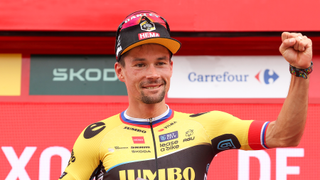
The move of Primož Roglič from Jumbo-Visma to Bora-Hansgrohe was one of the biggest transfers of the year and will have a big impact on the rankings next season, if his record holds or improves.
Roglič earned 5,604 points and if the points transferred with him (they don't), his total would move Bora-Hansgrohe into fourth in the team rankings ahead of Soudal-Quickstep and Ineos Grenadiers.
However, since Jumbo-Visma were so far above Soudal-Quickstep, the departure of Roglič wouldn't have affected their standing.
It's too soon to say how the already announced transfers will impact the ranking dynamics next year, as only a few teams have announced their final rosters.
Lidl-Trek have made a huge bid with their acquisition of 10 riders including Andrea Bagioli, Tao Geoghegan Hart, and Jonathan Milan. Their point tallies would have pushed Lidl-Trek into third in the rankings and could have a big impact in 2024.
Bahrain-Victorious, losing Mikel Landa to Ineos, and Groupama-FDJ with Thibaut Pinot's retirement, were the biggest transfer losers so far. Both would have been good for five lost spots in the team rankings.
Astana's signing of a dozen riders, most notably Davide Ballerini and Michael Mørkøv from Quickstep, Ide Schelling from Bora and Max Kanter from Movistar might be enough to lift them out of the relegation zone.
*per Procyclingstats.com

Laura Weislo has been with Cyclingnews since 2006 after making a switch from a career in science. As Managing Editor, she coordinates coverage for North American events and global news. As former elite-level road racer who dabbled in cyclo-cross and track, Laura has a passion for all three disciplines. When not working she likes to go camping and explore lesser traveled roads, paths and gravel tracks. Laura specialises in covering doping, anti-doping, UCI governance and performing data analysis.
'I know I can do better' – Demi Vollering moves on from Classics, focuses on Vuelta Femenina
Itzulia Women past winners
POC Aspire cycling glasses review: A sturdy and stylish modern classic
Most Popular
2-FOR-1 GA TICKETS WITH OUTSIDE+
Don’t miss Thundercat, Fleet Foxes, and more at the Outside Festival.
GET TICKETS
BEST WEEK EVER
Try out unlimited access with 7 days of Outside+ for free.
Start Your Free Trial
Powered by Outside
UCI WorldTour points championship — what does it mean?
Alejandro valverde won another worldtour points championship title on sunday, but did anyone really care.
Heading out the door? Read this article on the new Outside+ app available now on iOS devices for members! >","name":"in-content-cta","type":"link"}}'>Download the app .
Every year at about this time, the same question always comes up: Does the UCI WorldTour points championship really mean anything?
Once again, veteran Spanish rider Alejandro Valverde clinched the individual title, with Joaquim Rodríguez, Nairo Quintana, Alexander Kristoff, and Fabio Aru rounding out the top five. Remarkably, Valverde and his countryman Rodríguez, have combined to win this title five out of the six years since the WorldTour began.
While both men are consistently top riders, and are widely acknowledged as among the strongest and smartest racers in the peloton, some question if they are the absolute best in the world. Alberto Contador — multiple grand tour victor, often considered the best stage racer of this generation — has never won the points championship. Chris Froome — winner of two of the last three Tours de France — hasn’t won it either.
Although well-intended, the WorldTour points championship has really never caught on with the public for several reasons. The scoring system and rationale is not easy to understand. For example, why isn’t the rider who won the most races (Kristoff) the champion? Why aren’t the winners of the big grand tours (Contador, Froome, Aru) ranked more highly? Winning in pro cycling is a game of inches — often literally. It’s possible that a rider ends up with half the points of his archrival, even though he was only a wheel-width from winning. Is that fair? And finally, some ask, “How can this be a real championship if the outcome is known before the season is even finished?”
Several ideas have been proposed to make the point system more equitable and more reflective of the true nature of the sport. The UCI could “flatten out” the points so they aren’t as focused on the winner or top finishers. It could rebalance the relative importance of races, so that points better reflect the historical or financial significance of races. Maybe it could award extra points to the individual jersey winners in tours? Or to all the riders on the winner’s team? What about the more subtle, strategic aspects of the race — how about some “domestique of the day” points?
But none of those changes would remove the controversy. In fact, they could make it worse. The other ranking models, developed by stat sites like Cycling Quotient and ProCyclingStats, utilize more complex algorithms, and they still suffer from the same qualitative weaknesses and arbitrary judgments. And at some point, more analytical detail runs into the law of diminishing returns — a fancier system won’t have much appeal if it is inscrutable.
Plus, all these systems tend to come up with the more or less the same answer anyway: Valverde leads in all three major ranking systems.
The real problem with the points system occurred a few years ago, when it was used to determine which teams did or did not qualify for a WorldTour license. Fortunately, with a smaller pool of top pro teams at the moment, this is not a problem. The point-buying schemes, controversial rider transfer shenanigans, and irrational teamwork disincentives (see “What’s the Point?” in the July 2013 issue of Velo magazine) have lessened. But the UCI does need to ensure that it finds another more logical and less disruptive way to measure “sporting criteria,” so that these problems don’t reoccur, should the pool of teams increase again in the future.
At the end of the day, the points system basically works as intended — a simplified measure for fans to track the best all-round, most consistent day-to-day and season-long GC rider. Not necessarily the strongest, the fastest, the most popular, or the winner of the biggest races — just the most consistent. And let’s face it; at the end of the day, cycling just doesn’t lend itself to the sort of clear-cut quantitative analysis that other sports like baseball or basketball do.
There will never be a single best rider, best climber, or best domestique. Instead, in every race, cycling presents a rich and diverse fabric of differing physical strengths and mental skills. There are many different kinds of winners, and that is part of the allure and magnificence of the sport.
Steve Maxwell is a business consultant, writer, and cyclist in Boulder, Colorado. He is a frequent contributor to VeloNews , and is also the co-editor of theouterline.com , which publishes detailed analyses of structural, economic, and governance issues in pro cycling. Follow him on twitter @theouterline.
Popular on Velo
>", "path": "https://velo.outsideonline.com/gravel/gravel-racing/video-pro-downhiller-luca-cometti-takes-on-gravel-racing-in-first-100-mile-ride-of-his-life/", "listing_type": "recirc", "location": "list", "title": "video: pro downhiller luca cometti takes on gravel racing in first 100+ mile ride of his life"}}'> video: pro downhiller luca cometti takes on gravel racing in first 100+ mile ride of his life, >", "path": "https://velo.outsideonline.com/road/road-racing/lauren-stephens-and-tyler-stites-superior-in-tour-of-gila-tt/", "listing_type": "recirc", "location": "list", "title": "lauren stephens and tyler stites superior in tour of gila tt"}}'> lauren stephens and tyler stites superior in tour of gila tt, >", "path": "https://velo.outsideonline.com/road/watch-latest-time-trial-tech-pro-peloton/", "listing_type": "recirc", "location": "list", "title": "watch: the latest time trial tech in the pro peloton"}}'> watch: the latest time trial tech in the pro peloton, >", "path": "https://velo.outsideonline.com/urban/urban-culture/on-the-lambic-beer-trail-searching-out-belgiums-famed-slow-beer/", "listing_type": "recirc", "location": "list", "title": "on the lambic beer trail: searching out belgium’s famed ‘slow’ brew"}}'> on the lambic beer trail: searching out belgium’s famed ‘slow’ brew.

- Buyer’s Guide
- Gear Reviews
- Rides+Events
- Training Guide
- Maintenance
UCI adjusts points system for WorldTour teams for 2023: Good news for Israel-Premier Tech
Several changes made in light of controversial downgrades for ipt, lotto dstny and uno-x.
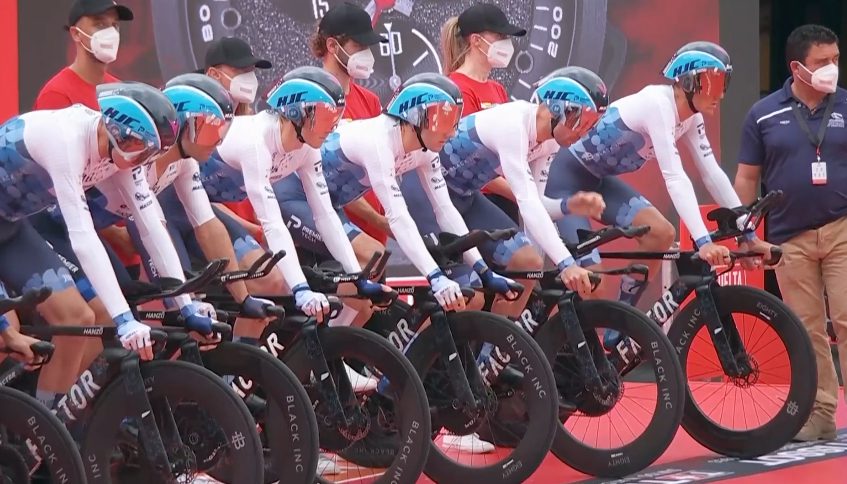
Following the announcement of teams registered by the Union Cycliste Internationale (UCI) for the 2023 season, the international cycling body has made some changes for the points structure. The UCI also confirmed that three teams would be downgraded from the WorldTour, including Israel-Premier Tech. However, on Friday, those teams received some good news as the UCI backpedalled slightly on its ruling.
In a statement, the UCI posted that after the three-year cycle, various stakeholders involved in professional men’s road cycling expressed a wish to adjust the existing points scale to attach more value to the most prestigious UCI WorldTour races, and rebalance the respective importance given to one-day races and stage races.
Main changes to the points scale
– Increase in the number of points attributed by the three Grand Tours – the Tour de France, the Giro d’Italia and the Vuelta Ciclista a España (final general classification, stage and secondary classifications)
– Creation of a special category for the five Monuments (Milano-Sanremo, Ronde van Vlaanderen, Paris-Roubaix, Liège-Bastogne-Liège and Il Lombardia) with a greater number of points attributed to them compared with the other one-day races on the UCI WorldTour
– Increase in the number of points attributed during stages of races of the UCI WorldTour and of the UCI ProSeries; in future, points will be awarded for finishes lower than third place (all the way down to fifth, tenth or 15th, depending on the competition)
-Increase in the number of points distributed during the Olympic Games and the UCI road world championships (road races and time trials in the elite categories)
Additionally, the UCI world ranking for teams, which up until now has been determined by the total points obtained by the best 10 riders in each team, will now be calculated on the basis of the results of the best 20 riders (which corresponds to the minimum number of riders for UCI ProTeams.)
The UCI believes that this increase in the number of riders is designed not only to better reflect the competitive strength of the teams, but also to reduce the downside of their best riders being unavailable for any reason (for example injury or illness) during a given season. This was one of the reasons Sylvan Adams had hoped would avoid his team being downgraded. The Israeli-Canadian cited COVID-19 as a factor for disrupting IPT’s ability to gain points since 2020.
With the UCI World Ranking for teams acting as the basis for the evaluation of the teams in terms of sporting criteria (for the purpose of awarding UCI WorldTour licences), an increase in the number of riders whose results are taken into account will help to reduce the pressure that is currently imposed solely on a limited number of them, and which can lead to a series of negative consequences. Those kind of “negative consequences” include risks of injury, excessive numbers of race days, temptation of doping and so on, the statement read.
The system of mandatory invitations to UCI WorldTour races has also been modified, on a temporary basis. For the 2023 season, any UCI ProTeam which lost its UCI WorldTeam status at the end of the 2022 season due to sporting criteria and which is not one of the teams eligible for mandatory invitations will automatically receive invitations to stage races (with the exception of the Grand Tours) and one-day UCI WorldTour races.

- Email address: *
- Phone This field is for validation purposes and should be left unchanged.
UCI announces complete overhaul of WorldTour points system
From the start of 2017, the men's WorldTour will use the same points system as the World Ranking - Mountains and points classification winners recognised for first time
- Sign up to our newsletter Newsletter
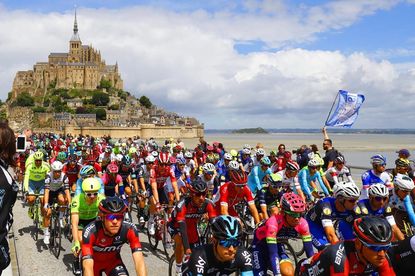
The Union Cycliste Internationale (UCI) announced on Thursday that it has made major changes to the men's WorldTour road race ranking points system for the 2017 season.
Confusingly, the UCI WorldTour ranking used a completely different points scale to the similarly-named UCI World Ranking, which was introduced for the 2016 season.
Now, the WorldTour will use the same points scale as used for the World Ranking.
This means that riders will now get points for placing in the top 60 rather than top 20 of a race. In addition, points will be allocated to riders who top the final points and mountain classifications in Grand Tours, and points are awarded to a rider wearing a race leader's jersey per stage.
>>> UCI WorldTour 2017 calendar
"A greater number of riders will therefore be able to score points," said the UCI. "Which will improve the spectacle, benefit teams in the team ranking and reward riders who previously received no points when finishing below 20th place."
The WorldTour nation ranking has been scrapped all together, and the WorldTour team ranking will also been changed.
Get The Leadout Newsletter
The latest race content, interviews, features, reviews and expert buying guides, direct to your inbox!
>>> New WorldTour seems like ‘total chaos’, says race director
Previously, only the top five riders in each team had their points added together to give the team's figure. Now, all members of a team will have their points put forward to their team's ranking.
"This change should encourage better performances from the whole team because results achieved by all a team’s riders will be taken into account," says the UCI.
The WorldTour ranking only tallies points from races in the WorldTour calendar, while the World Ranking includes points gained from any event in the UCI road calendar. This comprises: UCI WorldTour, UCI Continental Circuits, UCI World Championships, National and Continental Championships, Olympic Games and Continental Games. There are currently 2,952 riders in the World Ranking.
The UCI also reports that the 11 newly-introduced 2017 WorldTour events – including the RideLondon-Surrey Classic – will have their own points scale.
The 2017 men's WorldTour kicks off with the Tour Down Under over January 17-22. Peter Sagan (Tinkoff) topped the 2016 WorldTour ranking.
UCI WorldTour points allocation 2017
Source: UCI race regulations

Thank you for reading 20 articles this month* Join now for unlimited access
Enjoy your first month for just £1 / $1 / €1
*Read 5 free articles per month without a subscription
Join now for unlimited access
Try first month for just £1 / $1 / €1
Nigel Wynn worked as associate editor on CyclingWeekly.com, he worked almost single-handedly on the Cycling Weekly website in its early days. His passion for cycling, his writing and his creativity, as well as his hard work and dedication, were the original driving force behind the website’s success. Without him, CyclingWeekly.com would certainly not exist on the size and scale that it enjoys today. Nigel sadly passed away , following a brave battle with a cancer-related illness, in 2018. He was a highly valued colleague, and more importantly, an exceptional person to work with - his presence is sorely missed.

Trek becomes American UCI Cyclocross series title sponsor, adding a fourth race to the series in October at its headquarters in Waterloo, Wisconsin.
By Kristin Jenny Published 25 April 24

These are the key actions that make an event actually inclusive and do more than just lip service.
By Marley Blonsky Published 25 April 24

Team reacts to governing body statement on Tuesday, day after new helmet was debuted
By Tom Thewlis Published 5 March 24
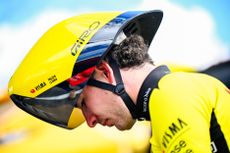
The 'head sock' is out, with more helmets to be reviewed - whilst hookless rim investigation is still ongoing
By Adam Becket Published 5 March 24

World governing body also investigating road-blocking team tactics used by DSM in the race as well as by Trek-Segafredo at Dwars door Vlaanderen
By Tom Thewlis Published 4 April 23
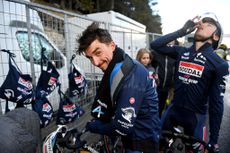
Soudal Quick-Step rails against the ruling body after his French team leader is penalised for removing his helmet while racing
By Peter Cossins Published 12 March 23
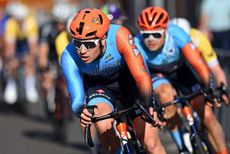
Former management of Ribble Weldtite courting interest in new project
By Tom Thewlis Published 12 January 23
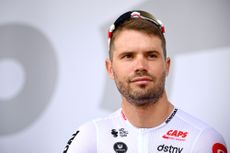
South African ex-Lotto Soudal rider fears more teams could find themselves in B & B Hotels-KTM situation if the system doesn’t change
By Tom Thewlis Published 9 December 22

The Dutch team’s senior sports director has spoken to Manchester United’s manager for sporting advice
By Owen Rogers Last updated 14 November 22
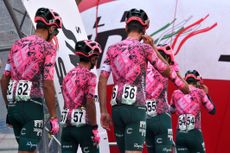
EF Education-EasyPost manager says he hated racing for UCI points
By Tom Davidson Published 11 November 22
Useful links
- Tour de France
- Giro d'Italia
- Vuelta a España
Buyer's Guides
- Best road bikes
- Best gravel bikes
- Best smart turbo trainers
- Best cycling computers
- Editor's Choice
- Bike Reviews
- Component Reviews
- Clothing Reviews
- Contact Future's experts
- Terms and conditions
- Privacy policy
- Cookies policy
- Advertise with us
Cycling Weekly is part of Future plc, an international media group and leading digital publisher. Visit our corporate site . © Future Publishing Limited Quay House, The Ambury, Bath BA1 1UA. All rights reserved. England and Wales company registration number 2008885.

UCI World Tour: The Secret Points System Explained

Winning a race is joyous and often a moment of great personal and team satisfaction. But the lesser placings matter, and not just for pride but for points.
Lately the UCI points system has taken a lot of blame for problems in the sport. Out of work riders lament the dash for points by insecure teams, unsure of their place in pro cycling’s top tier, some say the points system is an incentive for doping, all whilst some outside of road cycling rate the points so highly that they want them too .
But what if all this was wrong?
Let’s take a look at how the points of a team are calculated in order to qualify for the World Tour licence. This might sound like a dry and technical subject but it’s fundamental to the sport today. And totally misunderstood .
The First Rule of Points Club Forget the UCI rankings . The accumulation of points and the published rankings on the UCI website are not the same thing used to score a team’s position for its Pro Team licence, the automatic entry into all the World Tour races. There’s often a correlation but they’re not the same. Teams are ranked on a different measure called sporting value. Forget the UCI rankings.
Sporting Value Have you heard of the term “sporting value”? It’s the term used to define a team’s ranking in the internal system used by the UCI to judge whether a team is relegated or promoted from the World Tour, cycling’s first division, or Pro Continental, the second division.
Unlike most sports where the weakest teams are relegated and the strongest promoted according to obvious and visible rankings – like a league table – the UCI’s public rankings are not the basis by which teams are judged. Instead sporting value uses secret internal points system to rank the teams for promotion and demotion. This is not made public .
What is sporting value? It’s not sporting as in fair-play, instead this is the term used to describe points won thanks to placing well in races. Only read the UCI’s giant rulebook and, trust me, there’s no explanation. Teams get their licence based on four criteria: administrative, ethical, financial and sporting. The only mention of sporting value is that it is “ calculated on a the basis of a points scale approved by the UCI Professional Cycling council .” But this scale is not explained.
We know how many points the winner of the Tour or Milan-Sanremo wins for the UCI rankings but once again the points scale used for “sporting value” is not the same. It’s odd because, in reductive terms, automatic qualification for the Tour de France is often the single most important point for a sponsor and so even those putting millions into the sport can’t see the requirements in black and white.
How it works The deadline to register a pro team for 2013 has passed, it was back on 20 October. Before this date each time submitted their application for renewal.
When calculating a team’s sporting value the points of riders under contract for 2013 are used. This means the system is forward-looking, a team that loses its star rider will not qualify thanks to past results. Instead it is the addition of points from riders it has signed for the year ahead that counts.
Top 12 If you’ve got that it’s based on the team for the upcoming year, the next most important thing to grasp is that the UCI looks at best 12 riders on the team. So the points of the 12 riders with the most points count for the sporting value. The accumulation of rider points is confusingly named the “individual value” because it is the sum of the individual points.
It used to be 15 riders but now come down to 12 for 2013 onwards. The reduction is crucial because it means the team only needs to think about 12 riders and their points. So on a squad where up to 30 riders can he hired only a dozen count for their points meaning the team can have plenty of domestiques without a single point between them. Only the best 12 riders bring sporting value .
- Update : it’s been decided in 2013 that only the top-10 riders will count when it comes to ranking teams for 2014.
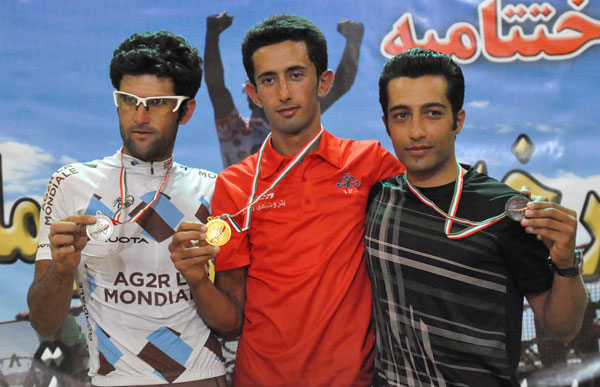
Qualifying Races All UCI races qualify but the points are weighted. For example the winner of 2.HC stage race receives the same number of UCI ranking points wherever the race is. But for the team value calculations, more weight is given to races on the UCI Europe Tour compared to those on the UCI Asian Tour, to reflect the relatively difficulty. Anecdotally we’ve seen how riders like Iranians Amir Zagari or Mehdi Sohrabi were very successful in Asia but struggled when they signed contracts with European teams Ag2r and Lotto-Belisol respectively. Nevertheless the weighting was still an incentive for these teams to sign them, the ratio of their points to their salary still made hiring them attractive.
Multi-year basis Next, another important matter. Points are won from the past two years, so for 2013 the UCI looks at the points haul from 2011 and 2012. This is important because it stops a rider’s value being too determinant on just one season’s performance, for example if they have a serious injury in one year then they can still count on the results from the previous year to help them rather than finding teams saying “sorry, you have no points, therefore no value”, this helps smooth the data.
Collective value Teams are also given bonus points for their teamwork. For example if team has topped the UCI Europe tour it wins bonus points, the same if a team does well in team classifications in stage races. This is new for 2013 because the points earned here go the team itself and do not follow with the rider. To explain, if a team wins a team prize in a race then the team itself wins points for this in the UCI sporting value, even if all the riders who won the prize sign for another team. This retrospective “collective value” is new for 2013 and these points are called “collective value.”
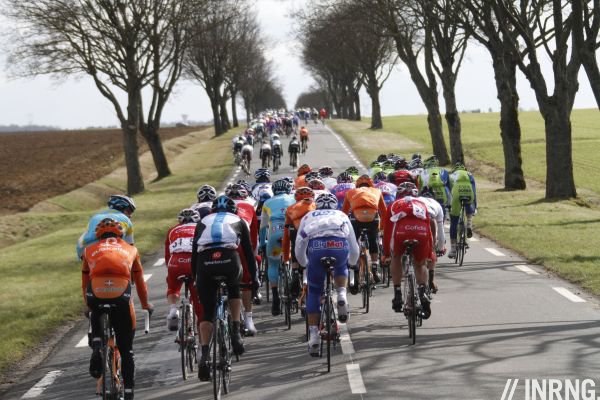
Statistical adjustments There are some manipulations to the data. For example the top-10 riders on the World Tour rankings see their haul modified downwards and an equal level of points is attributed to them. This is designed to stop teams going after one leader with a giant haul of points and pairing him with a lightweight roster. The same happens for the next ten riders and so on down the scale.
Special situations Special consideration can be given to a rider signed by a team who has no formal ranking points on the road but has had other success. For example a track or mountain bike world champion can be given synthetic individual value points to contribute to the team’s sporting value although the scenarios are limited, for example an omnium champion can get points but not a team pursuiter. Cyclocross star Sven Nys has just said he thinks top cross riders should be able to bring points to road teams… but this very idea is in place under the existing rules already. Only nobody knows about it .
Licence duration One regular question is why teams with a reported licence for several years still have to worry about relegation every year. It’s true that teams get multi-year licences that can last for four years. But there is an annual assessment. It makes sense,a team that meets all the requirements for its first season must continue to meet these levels for the remaining four years. This is protective, for example a team could signed riders with points to qualify for the World Tour in its first year only to let them go and hire some second-rate riders but still qualify for the Tour de France, sending a poor team but still cashing on on its presence in the race.
The flip-side is that sponsor holding a four year licence in fact has a one year licence followed by an option to renew annually. This is risky, the sponsor cannot know the state of the jobs market for riders in the upcoming years and the investment needed to keep hire enough riders with points.

Secrecy The exact arithmetic of the points system is top secret although last year cyclingnews got a glimpse . It’s not just UCI cageyness. Instead the idea is that if riders don’t know the points scale then they won’t race for points, unaware of the exact arithmetic they will eschew calculation and race to win.
However this good intention is having the reverse consequence. Many riders have the impression that they must have points to have a good contract when in fact only the top-12 on a team need to bring the points. If they only knew that points count for a few riders then they’d sleep better at night and race better in the day.
- Sporting value is based on the “individual value” of rider with points signed for the next season plus points from “collective value” of team results earned in the past year
- Only the top 12 riders on the team count towards the “individual value”
- Points are won in all UCI registered races but weighted towards the biggest events with the deepest fields
- An individual’s points come from the two past seasons, so for 2013 the rider’s results in 2011 and 2012 score points
- Bonus points for “collective value” are won for team rankings, whether the UCI rankings or classifications within stage races
- Special individual points can be attributed to non-road cyclists who join a pro team
Conclusion Is it clear now? If the precise arithmetic remains top secret hopefully you get the idea that teams are scored using an internal points scale based on the 12 best riders they have under contract for 2013.
I think the secrecy has backfired, the sport has got to the point where many riders are scrambling for points and blaming the system when in fact they might not need to worry so much. Even Sven Nys who sits on the UCI’s athlete commission appears confused by the system. With the move to counting the points of only the best 12 riders, down from 15 before, the majority of a team’s roster can be packed with valuable but “pointless” riders.
It’s right that a four year licence is not set in stone otherwise cynical team managers could sit on a four year licence and send weak teams to races but at the same time, this annual review is awkward because a sponsor who signs up today for a four year licence cannot be sure how much it will cost to assemble a qualifying team in three years’ time, which makes durable sponsorship hard to secure.
51 thoughts on “UCI World Tour: The Secret Points System Explained”
Good to see this public information assembled into 1 easy to understand article. It is hard to believe teams would not know about this, or riders. There were a number of riders whining about not getting a new contract because they do not have points. No journalist asked any further. Of course, the UCI should make a transparent way of determining the points, but the ignorance of teams, riders and journalists is unbelievable.
The teams know all about it, they have all the data tables and charts. But obviously the riders don’t get this and certainly not the followers of the sport who are left scratching their heads over how a team qualifies.
There seems to a theme of quite worrying ambivalence from teams towards their riders, be it on training (Dowsett at Movistar and Nibali at Astana two recent examples) or just explaining the points system. You can expect a healthy degree of antipathy between riders and management as employee/employer in any job, but do teams generally consider themselves to have a duty of care for their riders? Maybe this is one of those things an effective riders’ union could work on.
The reason that it’s not identical to the World Tour or Europe Tour rankings is that all the riders from all categories of teams are attributed points from any result from any tour calendar, which is not the case for individual tour calendar rankings. In that way, it makes sense that a different algorithm should be applied for the purposes of assessing the sporting value of a team whose riders could be derived from multiple levels of competition in the previous years. Assuming no major budget fluctuations, the only real instability caused by the system is among the bottom five WT teams and the top five PCT teams.
The system does not necessarily disadvantage domestiques. Good domestiques can (and do) maintain their value on a team without points since only a subset of the roster is used for the calculation.
Surely though if the teams know about it, then the riders will also know about it? A team wanting to increase it’s points haul for next year could tell a rider which races are worth sprinting for, and which aren’t worth bothering.
If the teams are keeping an eye on next year’s points, then it would be in their best interest to make sure that the riders they have signed for next year are bringing in the points.
Another interesting post. To cite the recent examples of Matt Brammeier and Posthuma, who both have blamed the points system for not getting a new contract, is the points argument a soft excuse for teams who no longer want to employ a rider?
However is top level domestique wants to drop down a level and ride for himself, he has no points and is not attractive to a Pro Conti team who would have to pay high wages for no points. That’s one obvious flaw.
@Ronan: PCTs don’t need points
Great effort at shedding light on this embarrassing topic. I miss an explanation of why points and team ranking have to exist in the first place. I suspect there is not a good one (except the power and money 18 team managers extract from the fact that races are not free to choose who takes part). But if we had to rank teams it would have to be only on the basis of placings in the team in every race’s team classification.
It’s good to create a list of teams with automatic qualification for the Tour and other big races and to do this by a ranking of the team’s ability to win races, it’s sporting ability. But how you go about doing this is not easy.
But what makes that “good”? What’s wrong with letting the races decide for themselves?
Uncertainty. If I’m mega-bucks company and looking for exposure, I might consider cycling. But only if I can be reasonably “sure” that I will be on TV on certain events before money changes hands.
See the fiasco with Unibet.
Unibet, like Geox, should have chosen to sponsor races.
Thanks for this article Inrng. I still think that the current points system is broken and something needs to be done to help the domestiques situation. The secret formula of allotting the team ranking should be made public so that teams can set specific goals for average riders on their roster.
It’s tremendously broken, in many ways. It also promotes conservative tactics, since it creates a big incentive not to risk losing things like “valuable top-10 placings”.
I disagree. Paris-Nice: 1st place 100 WT points, 10th place 4 WT points. For the rider values those 4 points are probably worth even less.
The incentive not to risk a valuable top-ten placing is fairly huge in all three GTs, though.
Makes you wonder exactly what Bugno does at the CPA all day every day.
He sits on the PCC (along with Cioni) on behalf of the riders. Receives every single doucment each year with full details of all changes to the proposed system etc, gets to vote on its approval.
Yet the people he represents seem to have no/limited knowledge of the system
Silly question maybe but what is the definition of a “team”? Is it based on the owner or the sponsor? i.e. Movistar is the latest edition of various teams from the past with different names/sponsors but which have always been the same “team” owned by the same owner. How is a team separate from a sponsor?
I believe the UCI uses the term “paying agent”: a company which hold the license, pays the salaries and receives the sponsor money. For example: Slipstream is the paying agent for the current Garmin team, Tailwind Sports was the paying agent for the famous US Postal/Discovery teams and Brixia Sports took over the Liquigas stuff to start the Cannondale team in 2013.
That’s right. The paying agent can be the sponsor itself, it can be a company created to run the team or it can be an individual who owns the team.
And the paying agent does not need to be the same person or entity as the license holder.
Another great write up. Was not aware of only the top 12 riders are considered. Thanks!
Argos is one of the sponsors of the team of CX world number one Kevin Pauwels.
All points should be ‘collective value’. The individual gets the glory and the fame, the team gets the rewards and the trophy. Happens in most other ‘team’ sports.
So how can this be still secret? Is the UCI still having such closed ranks that the excel sheet is not leaked into the public?
It’s not on the website but is given to the teams. The secrecy is explained above but given so many riders and fans think it’s all about points, it seems the story is bigger than the reality and it’d be good to see the position explained for all to see.
Good article. That only 12 riders count for points is very interesting. The griping about individual riders needing points should now fall on deaf ears. Riders aren’t renewed and have to retire every year, points or no points. There’s a fresh crop of neo-pros every year pushing out mid-level riders.
The current system does seems to create issues when a rider is leaving one Pro Tour Team for another, in that the “old” team is reluctant to enter that rider in end of season races. Presumably this is because the “old” team can’t see any point in allowing the departing rider the chance to score individual points when another rider on the squad who has signed for the following season could be given that chance. I think that is a problem which needs to be “fixed”. The points system should not operate to effectively sideline good riders with good form at the end of the season.
Thank you INRNG for this post, for this blog, and for the pleasant novelty of a comments section without the sewer-like quality of many other blogs and forums!
I agree with @Brendon re riders that have signed for another team next season. It’s not right when top riders are denied to start races for no other reason than not being able to collect points for the current team’s next season sporting rank. Maybe some part of a rider’s collected individual points should remain team points only, and not follow the rider over to a new team for the next season? Not easy to find a way to cover all interests here, but this problem really needs a solution.
There are three more criteria… “Teams get their licence based on four criteria: administrative, ethical, financial and sporting.” Adm and financial I guess are more or less straight forward, but how about ethical? What’s the real substance of that criteria? Are there “non-secret” measures to that?
What’s the reason for not splitting the points, half each to the team and the rider?
Again, new info for me. The 12 rider/team limit is actually a very clever way to enable teams to have domestiques. I wonder who’s benefit is it that the average cycling fan does not know about this??
Why not allow the team leader (who won the points) to distribute them as he wishes amongst the domestiques that helped him win? Just like prize money… points mean prizes!
I’ve seen this argument and am sympathetic to it but it’s not without risks. Imagine you are a classics specialist on Radioshack and all set to help Cancellara win in Belgium. Then he breaks his collarbone. No more points for you. In other words your points collection and therefore your income and job prospects can be dependent on fate.
I can see some continuing themes developing from this: – even higher wages for the small number of “prestige” riders (ie. the top 10 globally) who haul in the most points – potentially higher wages for the “super domestiques” who may not have points but who the “prestige” riders insist receive good treatment – renewed focus on teams classifications and team time trials – a greater number of “cross-over” riders from CX and MTB ranks – lower wages and less certainty (if that was possible) for everyone else.
I do think @Daniel is right: the team should get a proportion of its riders’ points to enable them to “invest in the future” (eg. where’s the incentive here to develop a promising young rider who may be a couple of years away from being in the above categories?).
I also think I read somewhere that no points are awarded for other jerseys in tours (eg. nothing for green or polkadot jerseys in the Tour. That sounds plain crazy – competition for these jerseys are often more interesting than a “team classification” for example.
The other staggering point, touched on by @ROC, is that the “ethical” criteria don’t seem particularly transparent or hard to satisfy it seems!
Inrng, thanks for a great post, you have made sense of the sporting criteria for me.
With regard to the ‘ethical’ criteria, this seems to me at present one of the biggest paper tigers in the sport, has any team that has qualified in the sporting criteria ever been refused a licence on ethical grounds?
I see this as a great opportunity, new champions leagues and other structural changes not withstanding. If a firm criteria which threatened worldtour status for doping positives or other ethical breaches such as race fixing or gambling (Vino, ahem) were implemented, teams may be more interested in making sure riders make it to the start line clean. The recent Mobistar rider who was quoted as saying that the team wanted to know nothing about a rider’s program and just expected them to turn up ‘fit’ for training must go with the dinosaurs. The implementation of a strict ethical component could help do that.
The rationale for the secrecy really does not make sense in my mind and I feel like there must be more to it than that! The UCI is always so zealous about maintaining their “control” and authority over these kinds of things, even to their extreme detriment. It seems like textbook over-compensation. I bet they drive huge trucks or stupid fast sports cars too.
What is the advantage of having the individual riders points weigh in on the decision if i team should be relegated or not?
Why not simply have a pure team ranking system, like we know from other team sports? When any rider wins a race, the points are given to the team and counting towards the overall ranking? The rider, who won the race, will get points that contribute to the individual ranking, which Joaquim Rodriques won this year.
So by hinting at the factors that are taken into account, but not publishing the weightings or calculations, the UCI has a model with enough free parameters that it can decide on the 18 teams it wants in, and manipulate the parameters to eliminate or promote any fairly borderline team it likes.
Of all things, this is a testament to Bruyneel. Who was the team manager who put nearly single minded focus on as many team ranking victories as possible in the spring? Inner Ring, you have done a marvelous job of showing us why this makes perfect sense for Bruyneel and his sponsors.
Setting that individual’s personal history aside, this strategy is a good one for the second rank of riders. As former pack fodder, I can appreciate that I might be kept around for team rankings and TTT opportunities even though I get few points in a year. That RSNT gets to keep my points may just be enough for them to keep someone like me.
Of course, in a strange way, this makes me more useful year to year than a star who likely to garner points in his own name and then jump to Astana. In the current point system, there is value to pack fodder riders and Bruyneel and others are smart enough to see it.
Does that make the point system right? No, it just increases the complexity of the chess match on wheels that our sport has become since we started stage racing.
By the way, ‘pack fodder’ is my term, and it applies to me. I mean no disrespect for the hard working journeymen who make racing work. In word, they rock.
Thank you for a great column.
Why not allocate all points to the team? Team management have a good idea who of their support staff, lead out men, and domestiques actually contributed to the team’s success whether they earned individual points or not, either in an outstanding way in certain moments or on a reliable consistent basis. The team, well actually the license holder, is a league franchise who can be bought or sold. Points backward looking for two years. If you want to create an entirely brand new team, you must work your way up from the bottom level, and the only other option is to buy out another team’s license. Ensures you can’t start up a Team Leopard at World Tour status level in one year by buying up riders, and shoving another team off the top level which has been there for years, only to fold or merge a year later when the billionaire’s interest wanes or finances dry up. The team ownership gains value as a franchise. This model attempts to get riders, teams and sponsors all thinking long term, or at least longer than now.
What’s the reason for the current points system? The teams are completely beholden to the UCI’s control. As a regulatory body they ought not be picking winners and losers in the license game. But they won’t give up that manipulative control easily or ever. Time for a breakaway league, provided the anti-doping effort is outside its mission, handled by a third party and monitored by WADA.
UCI doesn’t like it any more than you do. They lose their ability to grant a true 4-year license. It’s part of the deal with organizers to get the Grand Tours back into the World Tour.
- Pingback: inrng : getting a uci world tour licence
How about awarding points to everyone in the team that places a rider in the top 10? So the rider who wins gets X points, but all of his teammates get 1/10 X for helping to win? That would give the good domestiques some points as well.
Bear my ignorance. Am I getting this right? On the one hand, only the top 12 riders count. On the other, sporting value is forward looking. Let’s say Johnny Rocket is the No. 15 rider for Team A. Rocket transfers to Team B, where his points would rate No. 9. Does Team B get to count Rocket as its No. 9 rider?
So, am I right in thinking that the Asia tour riders signed up in the past and blamed for others loosing their places in a team; Firsty – had no effect on these riders employment Secondly – amassed so many points on their own, that they too a place in the top12/15 even without team points past or present Thirdly – only lasted a year as they served their purpose solely of providing much needed points
Or is there more to it? You mention ethics among the criterea thats top secret, what if they receive support in whatever form, from taking on a top rider from another continent in a similar way to a trial year.
The biggest positive I can see from the system is just that – Asia Tour riders have had an opportunity that they otherwise would never had regardless of how good they where because European teams fail to notice them and find no commercial value to them until pressure is applied. Given that financial security is also tied up for IRO 4 years, you have a long wait to get a chance otherwise, financial backing or not.
On that note, finances may also be a reason for these AsiaTour riders being signed up, im sure they dont always require a brand name to be added to a shirt.
For me the biggest question is not in the detail of how its calculated, but what can a domestique rider do to secure his place in the top flight without disregarding team orders? We could also do with transparency from riders/teams as to why theyve been dropped though this wouldnt help them get another job in many cases I suppose.
We all know whay this exists: Its
We all know whay this exists: Its…..to appease the GT organisors who wanted to make decisions on who entered their races all by themselves and the UCI wanted to run a league for financial security for teams via qualification for the big3.
Overall you gotta admit that weve seen some security amongst team finances given recent hard times, poor press and controversey. If it wasnt for the Olympic effect, Id imagine a few less teams at the top and much less concern for UCI points.
That said – the UCI again bathe themselves in secrecy and poor PR.
- Pingback: Får Team Saxo-Tinkoff en World Tour Licens?
- Pingback: inrng : thursday shorts
- Pingback: Farewell to Joost Posthuma | VeloVoices
- Pingback: inrng : new uci points changes
Comments are closed.
The UCI publishes the calendar for the 2024-2025 UCI Cyclo-cross World Cup
The Union Cycliste Internationale (UCI) and Flanders Classics are pleased to publish the calendar for the 2024-2025 UCI Cyclo-cross World Cup.
The 2024-2025 edition of the UCI Cyclo-cross World Cup will feature 12 rounds in six countries. A new venue will be added to the series: Oristano, in Sardinia (Italy). Six rounds will include, in addition to the events for Men Elite and Women Elite, races dedicated to the UCI World Cup Youth categories (Men Under 23, Men Junior and Women Junior).
2024-2025 UCI Cyclo-cross World Cup calendar:
Round 1: Sunday 24 November 2024, in Antwerp (Belgium)
Round 2: Sunday 1 December 2024, in Dublin (Ireland)*
Round 3: Sunday 8 December 2024, Oristano - Sardinia (Italy) - to be confirmed
Round 4: Sunday 15 December 2024, in Namur (Belgium)
Round 5: Saturday 21 December 2024, in Hulst (Netherlands)*
Round 6: Sunday 22 December 2024, in Zonhoven (Belgium)*
Round 7: Thursday 26 December 2024, in Gavere (Belgium)
Round 8: Sunday 29 December 2024, Besançon (France)*
Round 9: Sunday 5 January 2025, in Dendermonde (Belgium)
Round 10: Sunday 19 January 2025, in Benidorm - Costa Blanca (Spain)*
Round 11: Saturday 25 January 2025, Maasmechelen (Belgium)
Round 12: Sunday 26 January 2025, Hoogerheide – Noord-Brabant (Netherlands)*.
* Rounds marked with an asterisk include races in the Men Under 23, Men Junior and Women Junior categories in addition to the races in the Men Elite and Women Elite categories.
The rounds held in Dublin, Oristano, Hulst and Besançon have been granted a "protected event" status .
The full 2024-2025 UCI Cyclo-cross International Calendar, including the rounds of the 2024-2025 UCI Cyclo-cross World Cup, will be published at a later date on the UCI website .
The highlight of the season, the 2025 UCI Cyclo-cross World Championships, will take place from 31 January to 2 February 2025 in Liévin, France.

IMAGES
VIDEO
COMMENTS
The World Ranking teams points system tallies the points scored by the best 20 riders who are under contract with the team, and are published on Tuesday each week. Riders earn points in races ...
Under the new system, Carthy would have scored 160 points across both stages, a 567% increase. In the bunch sprints, Alberto Dainese scored 108 points across the three weeks of Il Giro 2022, but in 2023 he would have scored 370 points for his victory and five top 10 placements. While most of the changes are logical, the UCI has left the door ...
The UCI men's road racing world rankings are a point system which is used to rank men's road cycling riders. Points are accrued over a rolling 52 weeks in three categories (Individual, Nations and Teams). Also Year-End rankings exist, based on 12-month period in both Individual and Nations categories. All points available are determined on the ...
UCI Points and Rankings Tables Explainer. Tim Merlier wins his first Giro stage and weeks later he'd take a Tour stage as well. As well as satisfaction, media coverage and big lines on his palmarès, these wins brought him the sum of 220 UCI points… but in winning the Koksijde Classic and Elfstedenronde he got 325 points. With 2022 shaping ...
Teams. UCI Teams ranking. Summation of points for the 20 best riders under contract at the time of the ranking. UAE Team Emirates is leading the UCI World Ranking for teams with 12888 points, 5933 more than Alpecin - Deceuninck (6955) and 6051 more than Lidl - Trek (6837).
The UCI WorldTour is the premier men's elite road cycling tour, sitting above the UCI ProSeries and various regional UCI Continental Circuits.It refers to both the tour of 38 events and, until 2019, an annual ranking system based upon performances in these. The World Ranking was launched in 2009, (known from 2009-2010 as the UCI World Ranking) and merged fully with its predecessor the UCI ...
The ranking is computed each tuesday. You can find the daily updated UCI ranking here. 100/3322 results. UCI World Ranking by individual rider according to the UCI regulations. Tadej Pogačar has the most points (6558) before Jonas Vingegaard (5970.5) and Remco Evenepoel (4897.6).
For the Men Elite, the Teams UCI World Ranking is based on the points netted by the squad's ten top riders, while the Nations UCI World Ranking is based on the points of that country's nationality top eight-ranked individuals, regardless of their professional team. The Women Elite Teams UCI World Ranking is based on a squad's top eight ...
The UCI expanded the World Ranking team classification to the top 20 riders' points after the last relegation round in 2022 after teams complained the system too heavily weighted the one-day races ...
Road cycling latest news, details, rankings, calendar, results
UCI Points and Rankings Explainer. Wednesday, 29 January 2020. Richie Porte has just won the Tour Down Under and collects 500 UCI points, as many if he'd won Paris-Nice or the Tour de Suisse. A rankings system in pro cycling often seems pointless, it's a synthetic means to compare stage racers, sprinters and others who often only compete ...
For the last of the tables, here's the mixed relay time trial at the worlds which the UCI is keen on promoting, it's 300 points but this is divided by the three men, so 100 points each (of course the women get 100 each too): Riders can lose points too. The UCI rules include penalties for bad behaviour and some come with points deductions.
At the end of the day, the points system basically works as intended — a simplified measure for fans to track the best all-round, most consistent day-to-day and season-long GC rider. Not necessarily the strongest, the fastest, the most popular, or the winner of the biggest races — just the most consistent.
The main changes to the points scale attributed by the different race classes in the UCI International Road Calendar are as follows: increase in the number of points attributed by the three Grand Tours - the Tour de France, the Giro d'Italia and the Vuelta Ciclista a España (final general classification, stage and secondary classifications);
Away from sickness, Arkéa's push to the WorldTour has been threatened by Nairo Quintana's positive test for tramadol at the Tour de France, which has deprived the French team of 400 UCI points ...
The Israeli-Canadian cited COVID-19 as a factor for disrupting IPT's ability to gain points since 2020. With the UCI World Ranking for teams acting as the basis for the evaluation of the teams ...
Next two tables below shows the points on offer for stages in non-World Tour races and the daily points for leading the race too, the change for 2023 is more points for the podium in a .Pro race and points to fifth. ... *specifically* in order to relegate the ones which look less valuable for the sport as intended by the UCI. Part of the system ...
published 22 December 2016. The Union Cycliste Internationale (UCI) announced on Thursday that it has made major changes to the men's WorldTour road race ranking points system for the 2017 season ...
The 2024 UCI Europe Tour is the 20th season of the UCI Europe Tour. ... The quality and complexity of a race also determined how many points were awarded to the top finishers, the higher the UCI rating of a race, the more points were awarded. The UCI ratings from highest to lowest were as follows: Multi-day events: 2.Pro, 2.1 and 2.2;
UCI World Tour: The Secret Points System Explained. Tuesday, 13 November 2012. Winning a race is joyous and often a moment of great personal and team satisfaction. But the lesser placings matter, and not just for pride but for points. Lately the UCI points system has taken a lot of blame for problems in the sport.
The full 2024-2025 UCI Cyclo-cross International Calendar, including the rounds of the 2024-2025 UCI Cyclo-cross World Cup, will be published at a later date on the UCI website. The highlight of the season, the 2025 UCI Cyclo-cross World Championships, will take place from 31 January to 2 February 2025 in Liévin, France.